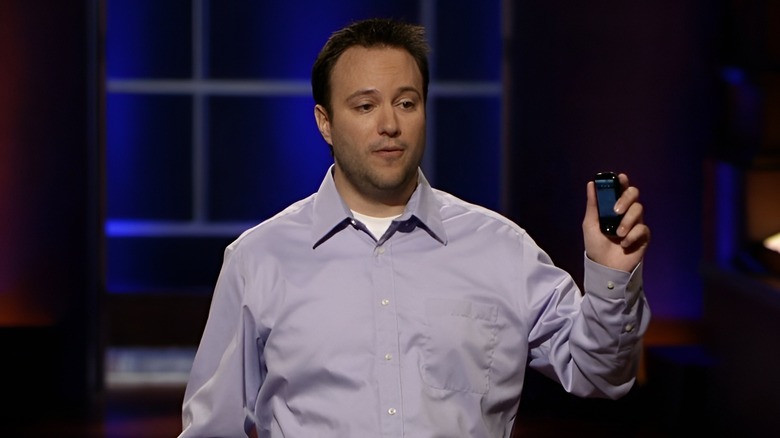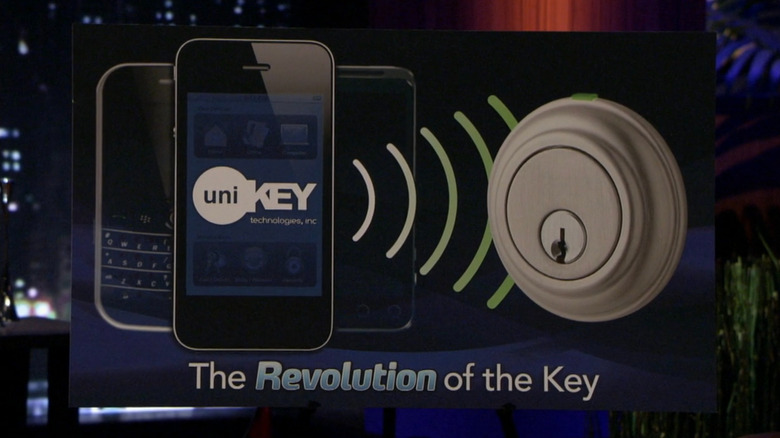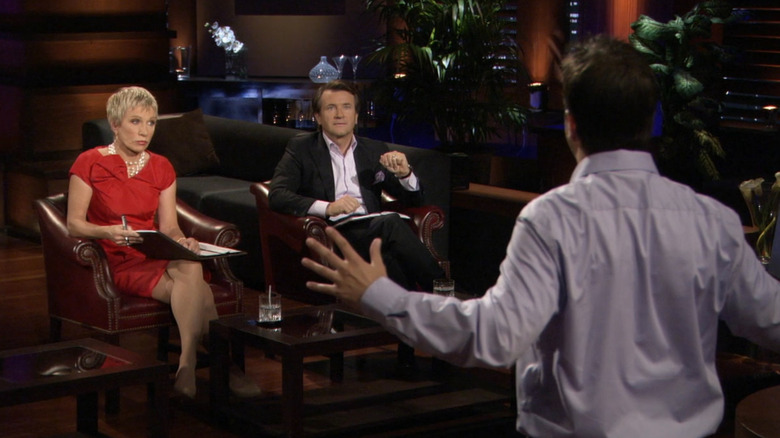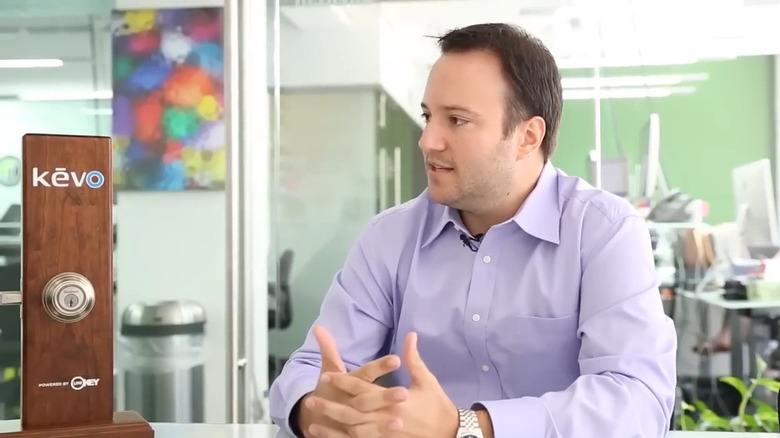What Happened To UniKey From Shark Tank Season 3?
We may receive a commission on purchases made from links.
While many are aware of the benefit of smart locks for homes, few think of keys as a high-end tech product. But as a tool we use in our day-to-day lives that's remained practically unchanged for centuries now, it's safe to say that the key is long overdue for an update. One Florida-based entrepreneur and inventor hoping to be at the forefront of that change went on to bring his idea to the team at "Shark Tank" to help make it happen.
UniKey developed an advanced mobile platform that allows users to open their doors with nothing more than your mobile device. When you and your phone are in close proximity to the door, all that is required is to gain access is simply to touch the lock. This makes it less cumbersome than similar systems, which often require you to open up an app or put in passwords, The door is unable to be opened unless your phone is present, or you send "keys" to other users for temporary or permanent use.
The origins of UniKey began with access control expert Phil Dumas. Dumas had been tinkering with access control solutions throughout his tenure at the University of Florida as an engineering major. He continued seeking more effective and simpler alternatives to other digital keys while working at startups early in his career before moving into the private equity space. With the rise of smartphones at the time, Dumas saw this as a golden opportunity to restart his idea and in 2010, UniKey was born.
What happened to Unikey on Shark Tank?
Phil Dumas enters the tank seeking a $500,000 investment for 33% in UniKey. Dumas demonstrates its safety by handing Mark Cuban his phone and going back to the door which he is now unable to unlock it. His intent is to license the UniKey technology to lock manufacturers, explaining that a deal to do so with Black and Decker is currently in the works. The final price will fall between $149 and $199 depending on the outcome of the Black and Decker deal. Kevin O'Leary expresses concern that consumers would rather go for a traditional $30 lock, especially in the then-current housing crisis.
Dumas' main goal is to further refine the technology, believing that even without the Black and Decker deal, they can find success elsewhere in the access control space. O'Leary further prods into the $1.5 million valuation which Dumas explains is a reasonable estimate for a technology company of this type. Along with the $500,000 he intends to raise from the sharks for patent protection, engineering, and equipment, Dumas needs an additional $600,000 to get to profitability. He ensures the sharks that he will make them their money back no matter what it takes.
O'Leary offers a partial deal of $100,000 for 10%, with the remaining $400,000 coming from another shark as well as a final total equity stake of 50%. Robert Herjavec, Barbara Corocoran, and Daymond John all make separate offers, until Cuban is willing to add the other $400,000 to O'Leary's deal and for 45%. After some negotiating, they bring the equity down to 40% with Cuban and O'Leary getting seats on the Board of Directors.
Unikey after Shark Tank
It's likely that Phil Dumas was riding quite the high after his "Shark Tank" pitch. Not only did he have all five sharks make him an offer to invest in UniKey, and reportedly the first contestant on the show to have that distinction, but the two investors he ended up with are among the show's most successful. However, not everything in the tank is as it seems.
After the episode's airing on May 18, 2012 as the final segment of the season 3 finale, it was revealed that the deal between Phil Dumas, Kevin O'Leary, and Mark Cuban did not go through. This may seem odd to some, but this is not an uncommon occurence in the aftermath of a company's time "Shark Tank," as the deal we see made on TV is little more than a handshake agreement between both parties. Following a prolonged period of due diligence that takes place after filming, the investors may attempt to alter the terms of the deal to better suit their needs. This seemed to be the case for UniKey, where Dumas shared that he backed out of the deal as neither side could see eye-to-eye.
But that did little to halt to UniKey's momentum. The company continued to receive funding from various investors and venture capitalists, eventually raising $2.3 million by May 2013. At the same time, UniKey struck a major licensing deal with leading locker manufacturer Kwikset, resulting in the Kwikset Kevo, a deadbolt door lock that allowed iPhone users to control their doors using Bluetooth Low Energy. More deals with names such as MIWA Lock Company and ERA Home Security followed in the coming years.
Is Unikey still in business?
UniKey has been able to survive and thrive long after its "Shark Tank" appearance. The platform is currently in use by more than 500 million locks across 65 countries, with over 350,000 of them being for residential use alone.
The widespread usage of UniKey can largely by attributed to its many licensing deals with a wide assortment of commercial and automotive players including Honeywell, Haven, Endura, VOXX Automotive, Hillman, and Autoslide to name a few. According to former UniKey Chief Operating Officer Seth Page, the team even managed to nab partnerships with the likes of Airbnb, Samsung, Google, Apple, and Motorola. On top of this, the company has been issued more than 15 patents for its unique technology while amassing over $25 million in venture capital.
While many of UniKey's products are marketed and sold to businesses, there are a number of items from the company that are available for regular homes such as the HAVEN Connect and Kwikset Kevo. The latter appears to be the most readily available and affordable, costing $250.27 on Amazon. Reactions to the Kevo are relatively mixed with a 3.8-star rating average, with buyers liking its simple design, easy installation, and ability to share with family and friends while criticizing the inconsistent performance of the app and unexpected add-on prices for certain upgrades.
What's next for Unikey?
It appears that even without the aid of "Shark Tank" giants Mark Cuban and Kevin O'Leary, UniKey has had no trouble dominating its respective field. With its revolutionary technology being used across the world on millions of doors and a treasure trove of big-time licensing partnerships, Phil Dumas has been able to prove the need for his access control solution across various industries. But like so many innovators, Dumas isn't comfortable staying stagnant.
There hasn't been much word in recent years from UniKey given the company's lacking social media presence and no posts on its LinkedIn. Nevertheless, some past comments from Dumas can give us an idea of his ambitions for the company. Speaking with TechCrunch in 2013, the founder shared his desire to eventually implement his technology into grander-scaled professional settings such as air travel. Additionally, he sees UniKey working in tandem with home control and automation platforms to give users a wider variety of ways to control their doors. Considering this lack is a complaint found in some Amazon reviews, along with the rise in popularity of innovative smart home devices, this seems like a natural next step.
But Dumas sees UniKey even extending beyond the physical space. In a 2016 interview with SecureID News, Dumas expressed interest in finding a way to eventually utilize the platform to take the place of device passwords, which would hopefully help cut down on password hacking. Whether this ambition ever comes to fruition has yet to be seen, but given the time and care Dumas and company have put in to making its technology the best it can be, there's undoubtedly a bright road ahead for the company.




